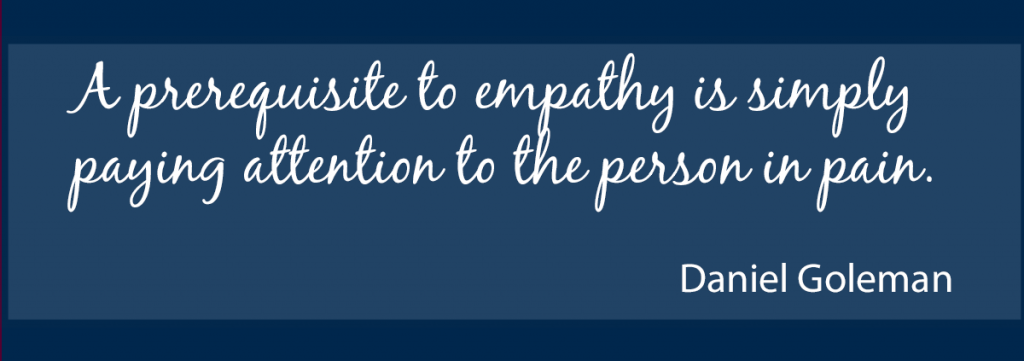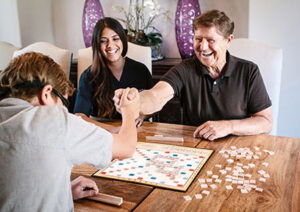Caring for someone requires many things, one of the most important of which is the ability to empathize. While the capacity to understand and feel for another person may come easier for some, empathy is not something you are necessarily born with. Empathy is a consciously or subconsciously learned skill, and like any other skill, it can be learned, improved, and even mastered.
What is Empathy?
While not a widely-considered fact, genuine empathy for another comes from the practice of learning to recognize and acknowledge your own pain and struggle first. And once you do that, are you gentle and accepting or are you very hard on yourself? Do you have little patience with yourself, are deeply critical, and get angry, even calling yourself harsh names when you make a mistake? Unfortunately this is the behavior many of us adopt. Learning to treat yourself as you would others—in other words having consideration and empathy for yourself—needs to come first, before any success in exhibiting authentic empathy toward others is possible.
If you’ve ever been a caregiver, there may have been a time when the person you were caring for was in pain. Maybe they just came out of surgery or just received news that a close friend passed. Regardless of the cause of their pain (and whether it was physical or emotional), you put yourself in their shoes and understood what they were feeling. You may not have even known the person who passed and you may not have ever had a surgery in your life, but you identified with their feelings on a personal level. That’s what empathy is.

The Greater Good Science Center, a research institute that studies many sciences related to well-being, defines empathy as the ability to sense other people’s emotions, coupled with the ability to imagine what someone else might be thinking or feeling.
There are two main dimensions of empathy: cognitive empathy and affective empathy.
Cognitive empathy is the ability to objectively identify another person’s feelings or perspective. For caregivers, cognitive empathy is crucial.
Affective empathy, commonly referred to as emotional empathy, refers to the ability to feel what another person is feeling.
Ways to Improve Empathy
Maintain eye-contact.
Eye contact is critical when you are communicating with the person you are caring for. Take a moment to think about a time where you were talking to someone about something you were going through, only to have them look away or check their phone. Just from their gaze, you knew they were distracted. This probably made you feel as if they didn’t care.
Helen Riess, a psychologist, gave a TED Talk entitled “The Power of Empathy.” In her talk, she explained that every person wants to be seen, heard and understood. That order is no coincidence. In order to empathize with someone, we must start by looking at them. The next time the person you are caring for is speaking, make sure to make eye contact.
[Tweet “Everyone wants to be seen, heard, and understood.”]
Listen.
One of the quickest ways you can improve your ability to empathize is to listen to what the other person is saying. Keeping an open mind and remaining curious can help you avoid making assumptions. Get the whole story before you decide how you think they are feeling.
Be aware of facial expressions.
The next time you are caring for someone, pay close attention to their facial expressions. They are not called, “the road map to human emotions” for no reason. Facial expressions are difficult to control and these small movements are often dead giveaways to how someone is feeling. Use them as clues to help you understand beyond what the other person is saying.
Don’t forget to be mindful of your own facial expression. If the person in your care is expressing discomfort, make a concerned face. Don’t forget to smile when they are sharing something exciting. Failing to express emotions or notice expressions in others is going to you appear detached, the opposite of what you are going for.
Be mindful of your body language.
Body language is another powerful conveyer of another person’s feelings. There was a study conducted where doctors were instructed to communicate with patients either standing up or sitting down. It was concluded that doctors who sat down when communicating with their patients were rated as more caring and compassionate. The patients whose doctors’ sat down even perceived their doctors had spent more time with them.
The next time you care for someone, don’t just sit down. Be mindful of other aspects of your body language such as posture. Simple adjustments such as facing the person when communicating with them and maintaining an “open” position by uncrossing your arms and legs can go a long way. We are biologically programmed to react to these “approach” and “avoid” signals, making it a significant factor in how we are perceived.
Tell them you understand the way they feel.
One mistake many people make when practicing empathy, is they forget to tell the other person they understand how they feel. It’s never a good idea to assume someone knows you understand. The best way to let a person know you care is to tell them.
More Ways to Improve Empathy
Most feelings are mutual. If you would feel a certain way about a given situation, odds are another person would feel similar.
If you go into your care role feeling like you would rather be somewhere else, by default, the person on the other end is going to feel like a burden.
Speak with a lower voice when trying to comfort someone going through a difficult time. Sound excited when the time is right.
Never underestimate the power of a light touch. Sometimes, you may not know exactly what to say. Simple gestures such as a touch on the shoulder can go a long way.
The Empathy Trap
The ability to take on another person’s feelings does not come without a cost. As a caregiver, you may have a difficult time balancing the emotions of yourself and the emotions of others. If you are not careful, you may end up in the “empathy trap.”
The empathy trap is the feeling you get when you feel like you feel overwhelmed by the feelings of others. If you feel like you are having a difficult time distinguishing your own feelings from those of others, you may be at risk of falling into this trap. Sacrificing your own emotions is unhealthy and if you feel like you are falling into the trap, it is important to take notice and take a break.
Empathy Beyond The Care Role
Learning to empathize will not only improve the relationship you have with the person you are caring for, but it will also enhance the relationships you have with the other people in your life. Regardless of whether you are caring for a person out of love or because it is your job, empathy is going to make the difference in the quality of care they receive.
“Simple Ways to Care with Empathy,” by Ashley Levine, Amada Contributor.















